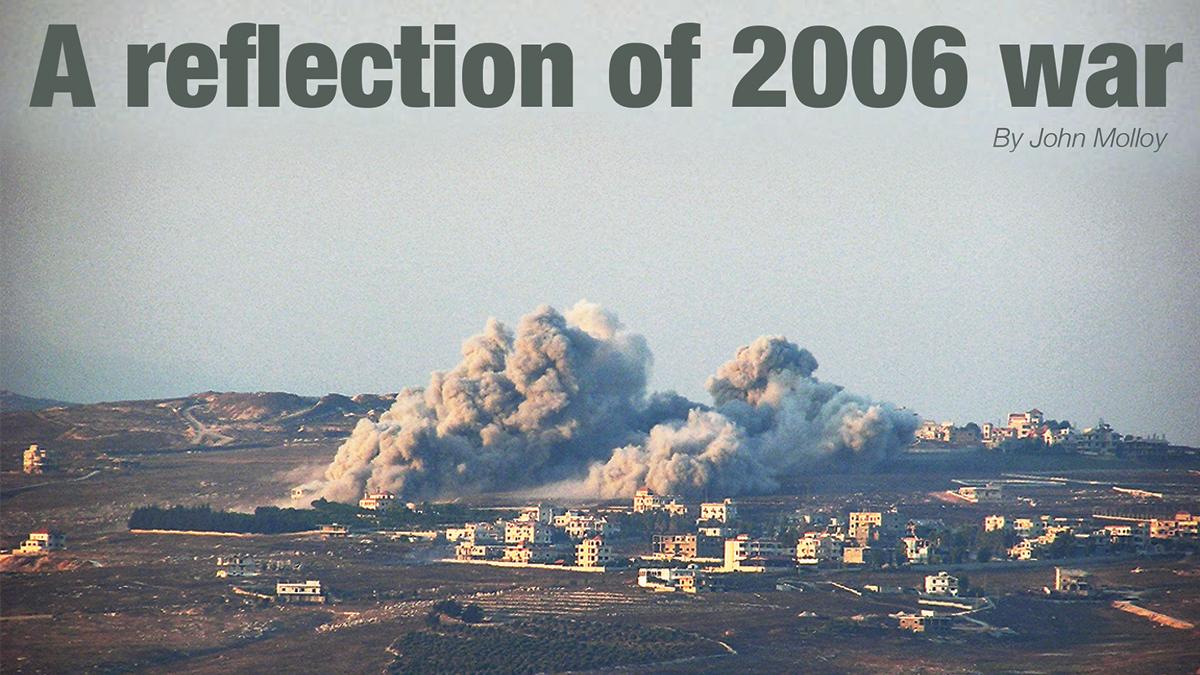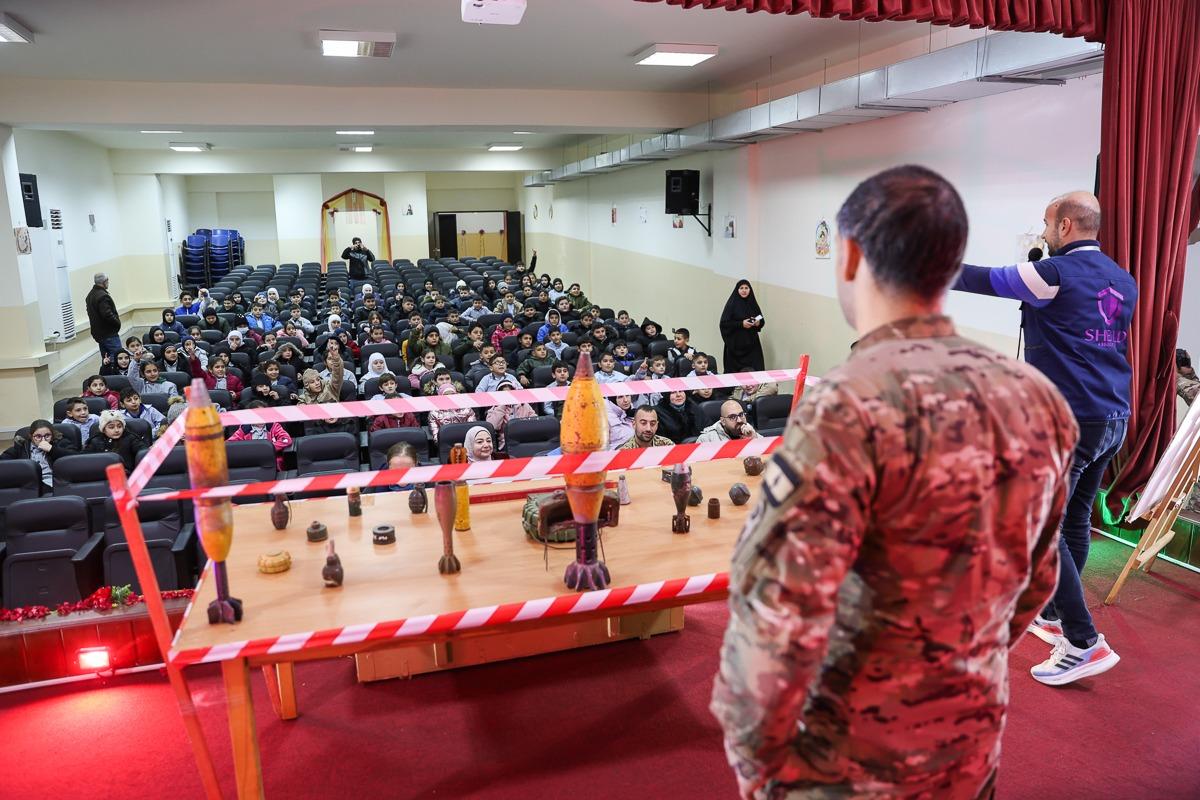I arrived (back) to South Lebanon in September 2005 for what was to be my fifth tour of peacekeeping duty with UNIFIL. Excited by the prospect of renewing old acquaintances and visiting the picturesque villages I was so familiar with from earlier years, my return felt more like a ‘home coming’ rather than a tour of duty in a foreign land. As Senior Liaison Officer I had the opportunity to visit locations and I particularly enjoyed the open freedom of driving and passing through friendly villages, no longer under occupation, a choice I was unable to do in former times. However in my contacts it soon became evident that behind the smiling faces an air of apprehension existed where the community sensed a level of volatility about their (peaceful) future. This unease, I learnt, was a reflection of the unstable political/military situation along the Blue Line, heightened by the all too often exchange of deadly fire. History proved the people right and their anxieties were well founded.
By the summer of 2006 UNIFIL had downsized to a very small force of some 2,000 persons, including both military and civilian personnel. In fact such was the case that one of the main topics of discussion within the mission in those days was UNIFIL’s future and its presumed anticipated withdrawal.
Wednesday 12 July 2006 started like any other day as I said goodbye to my wife in the idyllic city of Tyr and headed to work. Shortly after 9:00 a.m., information started to trickle in that an incident, without any details, had taken place along the Blue Line. Little did we realize at that time that this so called ‘incident’ was a Hizbullah attack against an Israel Defense Force (IDF) patrol and would develop into a devastating and overwhelming war which left many, mostly civilian lives and property destroyed in its wake. Nor did I know that it would be months before I could get back to my apartment and almost six months before I’d see my wife again, following her evacuation on 20 July.
Five weeks of horror and devastation
In the period leading up to the war UNIFIL had witnessed a number of skirmishes between Hizbullah and IDF and always used its good offices to restore calm but a ‘full on’ war between the two, was not visualised and took everyone by surprise. Such was the case that UNIFIL and others first assumed that the reported ‘incident’ was again another skirmish, soon to be resolved, as had happened before. An attempt by me to drive up to the Al Ras Naqoura crossing point later that morning revealed the true seriousness of what was unfolding when I observed first hand: some very intense fighting and the use of heavy weaponry and aircraft.
While casualties among civilians had already occurred in the first days, it was the early afternoon attack on 15 July that shocked us to the bone. An IDF aerial bomb hit a bus carrying civilians on the road between Sharma and al-Bayyadah resulting in 18 deaths, mostly women and children. By the time UNIFIL was informed it was already too late for the UNIFIL ambulance crews dispatched to the scene except the sad task of recovering the remains of those who died and bring them to the morgue in Tyre. UNIFIL, no different to the local population was also very challenged to drive and get about as most roads, bridges and tracks were impassable, destroyed by aerial bombs and vehicle movement came to an almost standstill. On 17 July news reached us that a UNIFIL staff member and his wife, along with their neighbours were victims when an IDF aerial bomb flattened their apartment in Tyre.
As the war progressed, UNIFIL turned its main effort to the rescue and support of the civilian population, trying to organize safe passage for those trapped in villages and allow them to leave the area. This effort proved to be a difficult undertaking and UNIFIL struggled due to the damaged communications and the destroyed road network to send relief convoys to the villages and respond to requests. We did our best to coordinate these movements with the Lebanese Red Cross and send relief when and where we could. By the second week of the war many civilians had acquired my phone number and when a connection was available I was inundated with calls asking to send assistance or to organise safe passage of private cars. However, this undertaking was not without risk as UNIFIL was unable to get any guarantee whatsoever of safe passage. The perils of undertaking these convoys of civilians fleeing their homes were fully explained to village organizers and the final decisions remained with them to go or stay. These very same coordination conditions were also imposed on UNIFIL convoys and to international agencies, without exception, regardless if they were UN marked logistical resupply/humanitarian vehicles or UN marked missions of mercy, trying to bring relief.
A constant air of gloom and frustration hung over UNIFIL as the daily reports of civilian casualties and destruction mounted from the villages where our efforts to assist were often thwarted. In this period even the sustainment and resupply of UNIFIL positions with food, fuel and basic necessities became a major challenge. UNIFIL itself was also not immune to the violence and every day we recorded artillery, air bomb and/or katyusha type rocket impacts either inside our positions or effects from their shrapnel. The recorded number of extraordinary escapes inside UNIFIL compounds from these bomb and shrapnel impacts is startling. However this situation was not to last and on 25 July an IDF aerial bomb completely obliterated a UN Observation Position (OP) on the outskirts of el-Khiam village, killing four unarmed UN Military Observers. UNIFIL had reported and warned that day, of up to 14 impacts of artillery and aerial bombings near this compound, to no effect.
Working daily with us in UNIFIL HQ, LAF liaison personnel provided great support and guidance, helping us to plan and coordinate all operational, civilian, logistical, medical and humanitarian relief movements. It was a fact that from this relationship UNIFIL was able to assist the local population with aid and evacuation.
End of war, beginning of dialogue
Finally on 14 August 2006 and much to the relief of all, Security Council Resolution 1701 (2006) came into effect. The day is also significant for it marked the convening of first Tripartite meeting between LAF and IDF, chaired by the UNIFIL Head of Mission. Initially set up to quickly supervise and coordinate the withdrawal of IDF out of south Lebanon and deployment of LAF up to the Blue Line, the meeting evolved over time into an indispensable forum to address Resolution 1701 issues. Now in its tenth year this key conflict management forum, has defied its detractors and proved itself, time and again as a ‘mechanism of choice’ in which the parties can express their positions and de-conflict potential or actual breakdowns to the cessation of hostilities.
As an observer and participant of this unique forum since its inception, I can say that were it not for this forum a number of tense situations on the ground could have taken us to a dangerous place and possibly a resumption of violence. Another and equally effective confidence building exercise achieved at Tripartite was agreement to measure and mark the Blue Line. This enduring process, guided by UNIFIL has helped the parties to visualise the Line in many areas thus removing confusion for all stakeholders and civilians alike and the possibility of misunderstandings.
LAF deploys south of Litani River
The Lebanese resilience is legendary as has been witnessed by UNIFIL over many years, going all the way back to its first deployment in 1978. This determination to rebuild lives and homes was once again evident with the announcement of the cessation of hostilities as the people from south Lebanon started to return immediately to their villages. You could only admire and applaud the Lebanese spirit to get back and start rebuilding their lives.
However, unlike in 2000, on this occasion there was one very important and momentous addition with the return of the southern population, as this time, they returned in the company of their army, the Lebanese Armed Forces (LAF). With great excitement, not to mention pride, the people of the south welcomed the LAF vehicles as they drove over the Litani River, through the villages and all the way up to the Blue Line. Finally as the LAF settled into their operational routine and new positions, I could not help but notice that a more relaxed atmosphere of normality and security descended over the area of south Lebanon a feature that was notable by its absence in the period 2000-2006.
Thriving life
Now, ten years after the heartbreak of the 2006 war we can look back on what I term as a ‘decade of calm’, and take notice of what can only be described as the ‘new roots of peace’ starting to take hold in the daily lives of the civilian population. I see every day happy and relaxed parents going to/from work and/ or dropping their kids to school. Normality has returned and anxiety levels are fading into the background. UNIFIL for its part works closely with many municipalities and local authorities to strongly support their communities and where possible to maintain this positive environment going forward.
And so, to conclude let me say that we know the negative past, we are enjoying the present calm and now we must work to ensure a peaceful future. The 2006 generation of Lebanese children in school today are now ten years old and unlike their parents/grandparents have never witnessed war in their own village or town. I am confident that the young children of today will appreciate their peaceful start in life in years to come.
Frederick (the Great) summed it up very well when he said, “what is the good of experience if you do not reflect” and now, in 2016 and a decade later, I have no doubt that our collective reflection and experience has combined to shape our present calm. I am also confident that this working together with the local community and LAF will ensure a peaceful future and can take us into the next decade and beyond, Inshallah.
- By John Molloy
(Currently a senior political affairs officer with UNIFIL dealing primarily with the tripartite forum and Blue Line marking issues, John Molloy was the UN Mission’s senior liaison officer, seconded by the Irish Defence Forces, during the 2006 war. Mr. Molloy completed his sixth military deployment with UNIFIL in December 2007 and returned to peacekeeping in UNIFIL in April 2008 in a civilian capacity. He wrote this article for “Al-Janoub”, reflecting back on his first-hand experience of the war.)
(This article was first published in the UNIFIL magazine “Al Janoub” in December 2016.)






